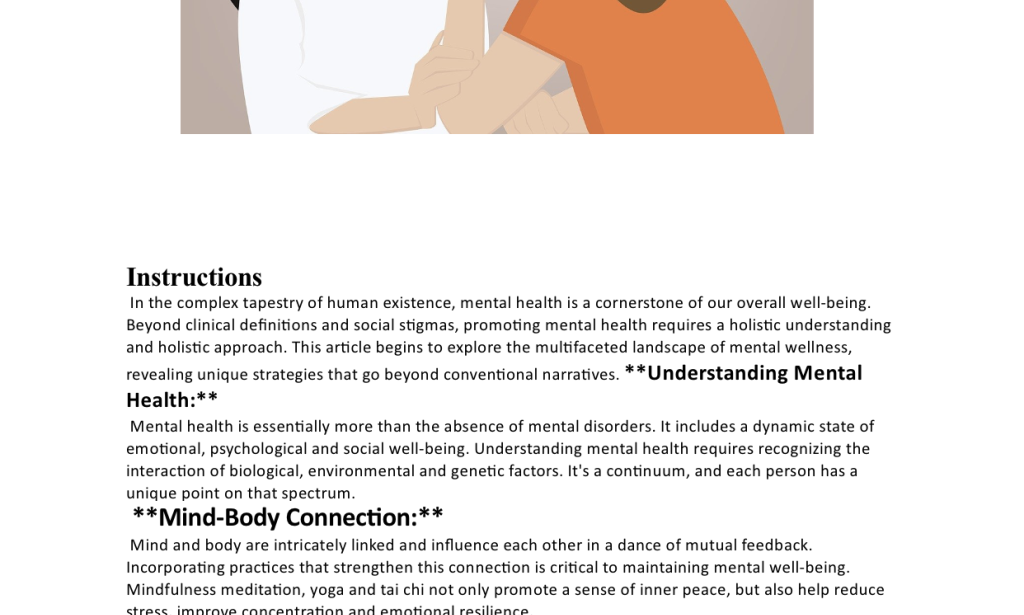Instructions
In the complex tapestry of human existence, mental health is a cornerstone of our overall well-being. Beyond clinical definitions and social stigmas, promoting mental health requires a holistic understanding and holistic approach. This article begins to explore the multifaceted landscape of mental wellness, revealing unique strategies that go beyond conventional narratives. **Understanding Mental Health:**
Mental health is essentially more than the absence of mental disorders. It includes a dynamic state of emotional, psychological and social well-being. Understanding mental health requires recognizing the interaction of biological, environmental and genetic factors. It's a continuum, and each person has a unique point on that spectrum.

**Mind-Body Connection:**
Mind and body are intricately linked and influence each other in a dance of mutual feedback. Incorporating practices that strengthen this connection is critical to maintaining mental well-being. Mindfulness meditation, yoga and tai chi not only promote a sense of inner peace, but also help reduce stress, improve concentration and emotional resilience.
**A balanced diet for brain health:**
The food we consume directly affects our mental health. A balanced diet rich in omega-3 fatty acids, antioxidants, vitamins and minerals supports brain function and mood regulation. Nutrient-rich foods like fatty fish, leafy greens, nuts and whole grains are the building blocks of optimal mental health.
**Sufficient sleep and circadian rhythms:**
Quality sleep is the cornerstone of mental well-being. Establishing a consistent sleep schedule and prioritizing sleep hygiene promotes cognitive function, emotional stability and overall mental resilience. Body and circadian rhythms, influenced by exposure to natural light, play a crucial role in regulating mood and sleep-wake cycles.

**Physical exercise and release of endorphins:**
Exercise is not only good for physical health, it also has a profound effect on mental well-being. Regular exercise stimulates the release of endorphins, the body's natural mood enhancers. Whether it's a brisk walk, vigorous exercise or your favorite sport, physical exercise is an effective ally in maintaining a positive mental state.
**Creating Social Connections:**
Humans are inherently social creatures, and meaningful connections are the foundation of common sense. Developing relationships with family, friends or community is a support network that protects against stress, loneliness and mental health problems. Acts of kindness and social inclusion increase a sense of purpose and belonging.
**Conscious breathing and stress reduction:**
Breathing acts as a bridge between mind and body. Using a conscious breathing technique, such as deep diaphragmatic breathing, activates the body's relaxation response, reduces stress and promotes a sense of calm. Integrating these techniques into your daily routine can be a simple but powerful tool for maintaining mental well-being.
**Therapeutic Practices:**
Engaging in therapeutic practices such as counseling or psychotherapy provides a safe space for people to explore and navigate their mental health. These interventions provide valuable insights, coping mechanisms, and a supportive environment for dealing with issues that may affect mental well-being.
**Nature and environment:**
Nature has a strong influence on mental health. Spending time outside, whether it's walking in a park, hiking in nature, or simply enjoying green spaces, has been linked to reduced stress, improved mood, and improved cognitive function. Connecting with nature offers a therapeutic respite from the demands of modern life.
**Creative Expression and Self-Discovery:**
Artistic endeavors, whether through writing, painting, music or other creative expression, provide a channel for self-discovery and emotional release. Participating in creative activities promotes a sense of accomplishment, self-expression, and a deeper understanding of one's thoughts and feelings.

**Building mindset and resilience:**
Building a positive mindset and resilience are important components of mental well-being. Embracing challenges as opportunities for growth, practicing self-compassion, and developing coping mechanisms allow people to move through life and difficult situations with greater emotional strength.
**Digital Well-Being and Technological Balance:**
KIn an increasingly digitized world, maintaining a healthy relationship with technology is very important for mental well-being. Setting boundaries, eliminating digital toxins and accounting for screen time promote a balanced and present state of mind.
**Conclusion:**
Cultivating spiritual well-being is a dynamic and holistic journey that encompasses various aspects of our life. By recognizing the interconnectedness of mind, body and environment, people can embark on a path that promotes not just lack of mental health, but flourishing mental health. From mindfulness practices to balanced nutrition, social connections and creative expressions, each element contributes to the symphony of mental well-being and creates a harmonious and robust state of mind in the tapestry of human existence..


You must be logged in to post a comment.